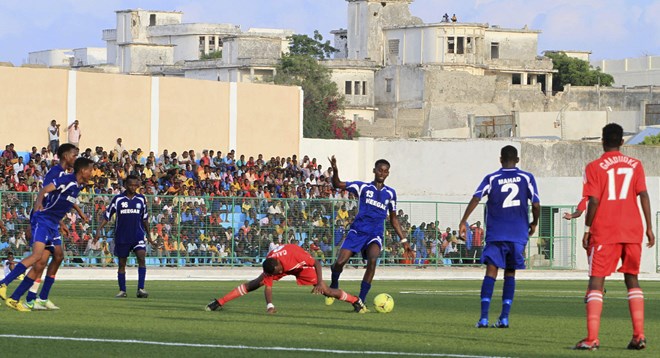Wednesday May 17, 2017
by Abdi Latif Dahir

After his surprise election in March, the first country the newly-elected chairman of the Confederation of African Football (CAF) visited was Somalia. Ahmad—who only goes by one name—visited the Somali capital Mogadishu in mid-April and said the country could start hosting international games yet again. Ahmad even went as far as asking Somalia and neighboring Djibouti to organize friendly matches in Mogadishu.
But that will be a task easier said than done. Mogadishu Stadium, Somalia’s largest sports complex, still acts as a base for the African Union troops fighting the terrorist group al-Shabaab. The group still attacks at will and even killed the heads of Somalia’s soccer federation and the Olympic committee in 2012. Somali athletes and swimmers have also frequently fled the country—one of them even dying while trying to cross the Mediterranean Sea.
But as the nation embarks on a slow political and economic recovery, sports is also making a comeback. Since 2011, mini-stadiums and neighborhood playgrounds have been renovated. Local companies are competing to sponsor soccer leagues, and foreign coaches and players from across Africa are flocking into the country to boost the profession. Girls are also returning to the court to play basketball—to the cheers of friends and families.
“We made this film to humanize a people and a place that has been through an unimaginable quarter century of challenges,” J.R. Biersmith, the film’s director and co-producer, told Quartz. For Sa’ad and Saadiq, those incredible odds manifested in fleeing al-Shabaab’s reign of terror, and subsequently facing ethnic profiling and police harassment in Kenya.
After a friend sends around video footage of him playing to coaches, Saadiq lands a try-out with a US university and secures a visa to travel to the United States. Sa’ad, who by then had left Mogadishu, also enters the refugee resettlement program and goes to the US in March 2016. But their troubles don’t end there: after Donald Trump became president, he proposed to ban citizens and refugees from seven countries—including Somalia—from coming into the US.
“Both of them came to this country believing that the fear they’ve lived with all of their lives would dissipate,” Biersmith said, “but the travel bans and other anti-immigrant rhetoric brings it all back.” His hope is that the documentary will widen the narrow lens of fear and show the “outsized dreams” of Somali soccer players.
“The truth is now out there for the world to see,” he said.
No comments:
Post a Comment